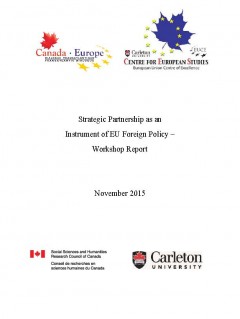The following report is from an April 13, 2015 workshop, co-sponsored by CETD and the Centre for European Studies at Carleton University, that analyzed the European Union’s strategic partnerships from a comparative perspective. The workshop provided the opportunity to evaluate the instrument’s future potential, while taking note of differing challenges in using the tool as the basis of relationships with established democracies, emerging democracies, and semi-authoritarian systems. It also helped unpack the EU’s notion of strategic partnership and offered assessment on its viability as a framework for the EU’s pursuit of a role as a global actor, as well as on the utility of the approach in terms of the EU’s underlying goals and objectives. Additionally, the workshop looked at the state of Canada’s strategic partnership with the EU and placed it in a comparative context.

This report was produced by CETD and the Centre for European Studies (EU Centre of Excellence) at Carleton University. CETD receives funding from the Social Sciences and Humanities Research Council of Canada (SSHRC), and Carleton’s European Union Centre of Excellence (EUCE), which receives funding from the European Union. The views expressed in this document are solely those of the presenters/authors, and do not reflect the views of CETD, CES, the European Union, SSHRC, or Carleton University.